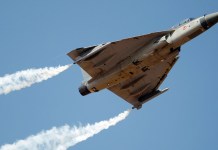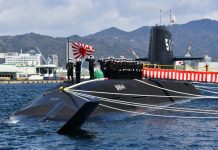An intense debate is going on among the American strategic elites over the fallouts of President Donald Trump’s decision to sell F-35 fighters to Saudi Arabia.
Many among them are concerned not as much over the possible dilution of the traditional support and solidarity with Israel because of the arms supply to Saudi Arabia as over the fears of China stealing the American military technology from Saudi Arabia, given the proximity between Beijing and Riyadh, of late.
After all, the United States has not delivered F-35s to the United Arab Emirates and Turkey so far due to concerns about Chinese technology exploitation, whether directly or indirectly through a third country. The same concerns are now being seen in this proposed sale-deal with Saudi Arabia, before the required Congressional approval.
On November 18, President Trump and Crown Prince Mohammed bin Salman, Saudi Arabia’s de facto ruler, finalized a series of agreements that included a major defense sale package, including future F-35 deliveries.
Though no details have been provided about when and how many F-35s would be delivered, the overall arms package could reportedly be around $142 billion, “the largest defense cooperation agreement” in U.S. history.
If Saudi Arabia gets the F-35, it will become the first Arab country to have arguably the world’s most sophisticated stealth aircraft. Predictably, the Israeli Air Force has already objected to this, saying Israel’s air superiority in the region could be damaged by the deal.
Israel is anxious to preserve what it says is its qualitative military edge (QME) in the region. Israel has a fleet of 45 operational F-35 fighter jets out of 75 ordered.
However, American officials and analysts who favour F-35s for Saudi Arabia are not worried over this issue, as these will be less advanced than those operated by Israel.
After all, F-35s used by Israel do have an increasing proportion of Israeli-made hardware and software modifications, including locally developed electronic warfare equipment and munitions. Such a unique ecosystem, which has American approval, is unlikely for any other F-35 purchasing country.
Besides, the U.S.-Israel relationship is so unique that Israel is allowed to operate its F-35 fleet independently, at least for an extended period, without needing support from the manufacturer or being tied into the aircraft’s cloud-based support system. Saudi Arabia would not have that capability.
In other words, Saudi Arabia will not have access to the F-35’s source code, independent mission software control, or the ability to integrate domestic weapons systems without U.S. approval. The aircraft will always be tied into the U.S.-controlled sustainment architecture, creating strategic dependency.
This limitation, perhaps, explains why, though the Israeli Air Force is unhappy, the Israeli government, according to The Times of Israel, is believed not to oppose the sale to Riyadh in principle.
On the other hand, the Israeli government expects that President Trump will secure the deal linked to his diplomatic efforts toward the normalization of relations between Saudi Arabia and Israel as another addition to the Abraham Accords he initiated during his first term.
As of November 2025, four Arab and Muslim nations have formally normalized relations with Israel under the Abraham Accords framework: the United Arab Emirates, Bahrain, Morocco, and Sudan.
This month, Kazakhstan became the first non-Arab state to join the accords officially. Israel now anticipates that Saudi Arabia could become the sixth signatory, with Riyadh reportedly seeking access to F-35 stealth fighters and a formal U.S. security guarantee as part of any normalization deal.
In other words, the Israel factor does not seem to be a potent one in blocking the delivery of F-35s to Saudi Arabia.
However, the real blocking factor could well be the fear of espionage of F-35 technologies by China. And that is because Saudi Arabia is a major customer for Chinese arms, and the two countries have a burgeoning relationship spanning many sectors.

Saudi Arabia has purchased intermediate-range ballistic missiles from China, including the DF-3 and DF-21. The DF-21 is a road-mobile ballistic missile with a range of over 2,150 km.
China is also said to be providing Saudi Arabia with significant technical assistance and manufacturing help for solid rocket fuel for locally produced weapons.
In addition, it is providing important drone technology and equipment to Saudi Arabia, including the sale of the Wing Loong II (Winged Dragon) and the CH-4, a medium-endurance drone. And China is reportedly pushing to export its J-35 twin-engine stealth fighter to the richest Gulf country.
Notably, the UAE’s pursuit of the F-35 was derailed in late 2021 when Abu Dhabi abruptly cancelled the $23 billion deal.
The Emiratis judged Washington’s stringent technology-safeguard conditions — designed to prevent any transfer or reverse-engineering of sensitive F-35 capabilities to China — as unacceptable intrusions on national sovereignty and incompatible with their growing defence and technology ties with Beijing.
Whether Saudi Arabia will agree to such stringent safeguards remains to be seen. As former US Deputy Under Secretary of Defense Stephen Bryen has argued, “Congress will need to evaluate the level of China’s penetration of Saudi Arabia’s defense industries, the safeguards that might be applicable to the F-35, and the impact of the sale of the F-35 on the regional power balance.”
According to noted China expert Gordon Chang, Beijing has already demonstrated its ability to penetrate U.S. defense programs and should be assumed to be targeting the F-35 again.
“We should assume China has everything already. They already stole the whole plane once. They probably did it again,” he told Fox News Digital last week, cautioning “Washington must balance the risks with the strategic benefits of strengthening ties with Riyadh”.
There is a powerful school of thought that believes China’s most advanced stealth fighters, the in-service Chengdu J-20 and the forthcoming Shenyang FC-31, incorporate stolen design elements from existing American and Russian fighter programs.
There is the story of aerospace executive Su Bin, who stole tens of thousands of documents on the F-22 and F-35 with the help of Chinese hackers.
Su Bin, who worked in Canada under the name Stephen Su, was a well-regarded businessman and entrepreneur in the aviation industry, serving as the sole proprietor of a small company that specialized in aircraft cable harnesses.
He established inroads within the Canadian and American defense industries, forming an extensive network of business contacts that, over time, allowed him to gain increasingly unfettered access to internal networks maintained by a variety of American and Canadian defense contractors.
In 2008, Su began working directly with two professional hackers employed by China’s People’s Liberation Army, using the information he had gained through his business contacts to enable the theft of more than 630,000 files from Boeing – a massive 65 gigabytes of data – related to the C-17 heavy-lift cargo aircraft.
But Su had a bigger goal. He subsequently collected information mostly on the development of Lockheed Martin’s F-22 Raptor and F-35 Lightning II. In fact, it is said that Su facilitated Chinese hackers’ access to F-35 information multiple times.
Last year, the “Five Eyes” intelligence partners (the United States, the United Kingdom, Canada, Australia, and New Zealand) issued a joint bulletin that warned that China’s People’s Liberation Army (PLA) is actively recruiting experienced military personnel, notably pilots.
The PLA “continues to target current and former military personnel from North Atlantic Treaty Organization (NATO) nations and other Western countries to help bolster the PLA’s capabilities,” the bulletin warned, adding that the Chinese military has set up private companies not only in China but also in other countries with the goal of hiring former fighter pilots from the West.
“The PLA wants the skills and expertise of these individuals to make its own military air operations more capable while gaining insight into Western air tactics, techniques, and procedures. The insight the PLA gains from Western military talent threatens the safety of the targeted recruits, their fellow service members, and U.S. and allied security,” the bulletin noted.
It is against this background that the Trump Administration is expected to urge strict defense assurances before final approval of Saudi Arabia’s request for the F-35.
And here, some analysts, like Can Kasapoğlu, a nonresident senior fellow at the Hudson Institute, argue that a successful F-35 deal with Saudi Arabia will prevent further strategic expansion by China in the Middle East.
“The Trump administration’s decision to supply Saudi Arabia with F-35s could reshape airpower in the Middle East for a generation. A fifth-generation fleet in the kingdom could enhance deterrence against Iran, strengthen the US-led regional coalition, and anchor the US—rather than China—as Saudi Arabia’s main defense industrial partner”.
The point here is that if Saudi Arabia remains within the U.S. defense ecosystem, it would be the best way to counter potential Saudi interest in Chinese J-20/J-31 platforms or Russian Su-57s.
It is further argued that the F-35’s advanced intelligence-gathering capabilities will provide the U.S. with more pervasive surveillance data on regional adversaries, supporting U.S. efforts to reduce its direct military presence in the Middle East.
Incidentally, Riyadh had entered Trump’s good book for assisting earlier this year in repelling the Iranian attack against Israel, as drones and missiles launched from Iran had to pass through Jordanian and Saudi airspace to reach Israel.
Saudi Arabia also reportedly passed on vital intelligence about Iran’s attack plans, as well as real-time tracking data, which, in turn, helped thwart Tehran’s assault.
Viewed thus, F-35s in Saudi Arabia will further boost intelligence gathering against regional adversaries, something Israel will also welcome, so the argument runs.
To sum up, it is a question of wooing Saudi Arabia away from Chinese influence.
Kasapoğlu seems to have a point when he points out, “For the United States, the choice is clear. Anchoring Riyadh in the US-led security architecture by delivering a carefully designed F-35 deal that preserves Israel’s QME advances US military and economic interests and regional stability. On the other hand, if the White House balks at the deal, it risks ceding strategic ground to Beijing in the Gulf’s most strategically vital market”.
- Author and veteran journalist Prakash Nanda is Chairman of the Editorial Board of the EurAsian Times and has been commenting on politics, foreign policy, and strategic affairs for nearly three decades. He is a former National Fellow of the Indian Council for Historical Research and a recipient of the Seoul Peace Prize Scholarship.
- CONTACT: prakash.nanda (at) hotmail.com




